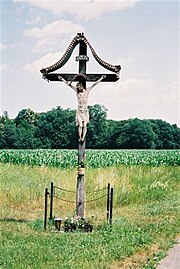
Sitting in an airport recently for several hours - a perfectly smart, pleasant, efficient airport - I had occasion to look around and realise something. Not only could I have been in almost any country of the world, and therefore I was in some sense "nowhere", but I was in a space where signs predominated over symbols. Everywhere I looked there were signs: pictures, advertisements, instructions, those little "icons" that tell you where the toilets are, or ground transportation. But the whole place had been constructed with absolutely no sensitivity to the natural symbolism of shape and number and light. Of course, that didn't mean that symbolism had been eliminated, just that it was inadvertent. The modern world tends to eliminate symbolism, because symbols, unlike signs, point us to something outside this world, something deeper and more real than toilets, or things to buy.
The final elimination of symbols that speak of the transcendent has not yet taken place, but the recent judgement of the Court of Human Rights that Italian schools must remove crucifixes from their walls shows that the struggle is intensifying. A crucifix may be treated as a sign, in which case it points to the social phenomenon of Christianity, much as a Union Jack represents the United Kingdom. This is how it is being treated by the Court - as the flag of Christianity. But the crucifix is also a concatenation of symbols, a symbol par excellence, the symbol of symbols. In a way, the attack on the crucifix is itself symbolic - of an attack on symbols in our culture.
It is more important than ever that our education should give special attention to cultivating the symbolic imagination. James Taylor's Poetic Knowledge is a helpful resource. What he calls "poetic knowledge" is the intuitive, tacit, connatural way of knowing that tends to be neglected in the pursuit of mere information. Catechesis, too, needs to take more account of the symbolic dimension of scripture and the sacraments. More on that another time.
I generally wear a cross, but if the EU wants to rattle sabres over here, then I think I'll be changing to a cricifix...
ReplyDelete